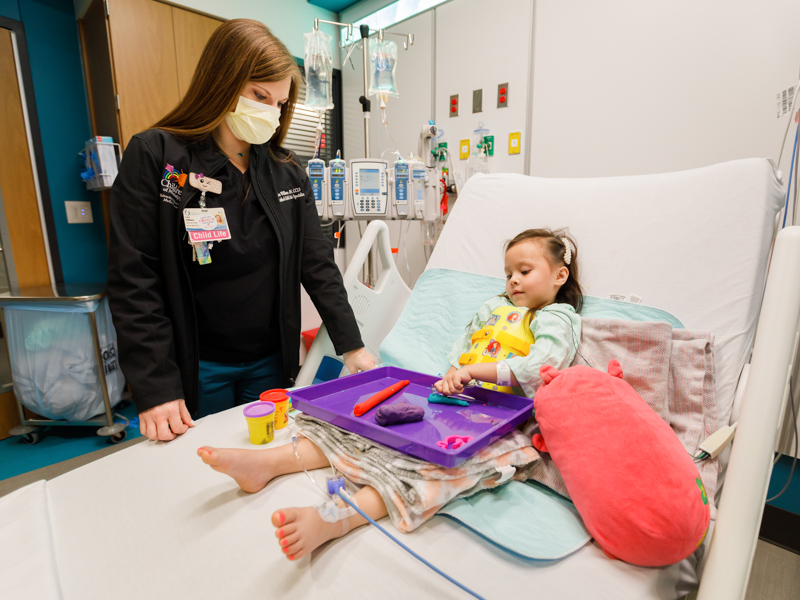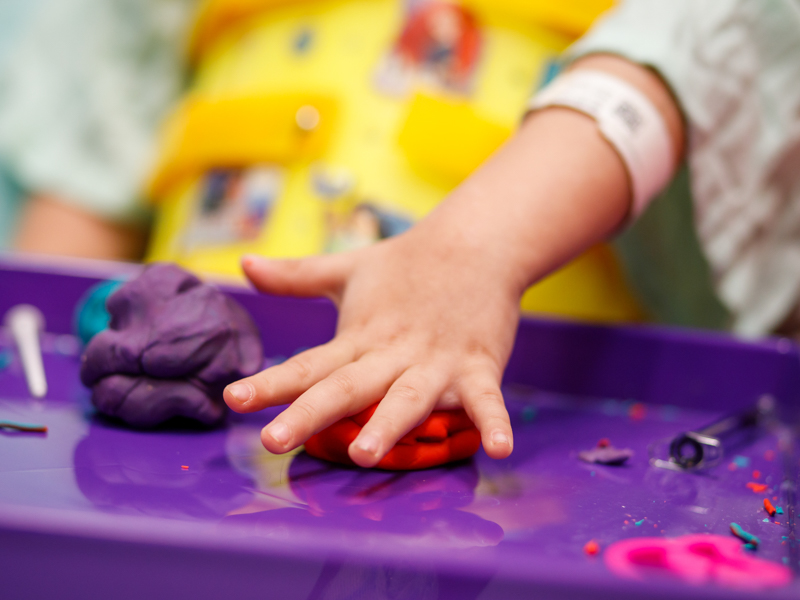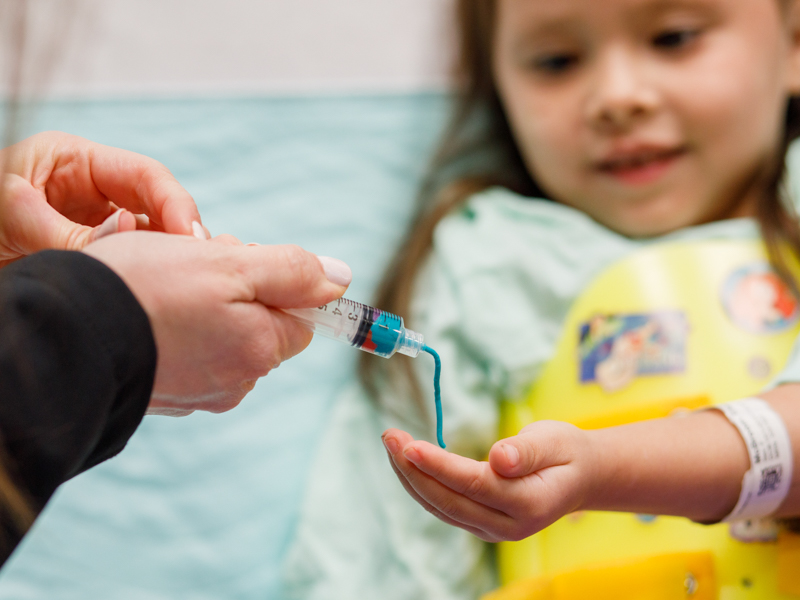The Power of Play: ‘Work of childhood’ key to coping, care

Note: This article originally appeared in the Spring 2021 issue of Under the Rainbow, the semi-annual magazine for Children's of Mississippi.
In January, Elena McBroom was making noodles, dropping green and purple bits of Play-Doh into a syringe and then pushing the plunger to press out long, thin strings.
What may seem at first glance like child’s play was strengthening the fine motor skills of the 4-year-old from Vicksburg, who was recovering after being injured in an auto accident.
“Play can do so much,” said child life specialist Cara Williams, who was working with Elena during her stay in Children’s of Mississippi’s pediatric intensive care unit. “Elena is having fun, but she’s also using her fingers and using a syringe in play. When patients use medical supplies as part of play, it desensitizes them to seeing medical equipment as part of their care and reduces anxiety.”
Play is more than having fun. It can be good medicine, Williams and other Children’s of Mississippi experts say.
“Play is an essential activity of childhood,” said child life specialist Tiffany Key, “and play is how children cope, process information and relieve tension. It is how we communicate with our patients and helps us motivate them to do things that will help them heal more quickly.”
MEDICAL CARE AND PLAY

Whether it’s playing a video game to encourage a patient to get out of bed or a pillow to help ease post-surgical pain, play is a key part of treating pediatric patients, Key said. “It puts children at ease and lessens the need for pain medication or sedation.”
In the hospital’s surgical areas, patients can drive toy cars to perioperative areas, allowing them to leave any fears behind.
Play can also help patients who have to be patient – those who are receiving medications or blood via infusion and those in dialysis at the University of Mississippi Medical Center’s pediatric artificial kidney unit.
For children who are recovering from trauma and relearning life skills, play helps them regain and strengthen motor skills, Key said.
MEDICAL KNOWLEDGE
If play is part of how a child communicates, then play done strategically can teach children about their medical conditions, about treatments and how to cope and to heal.
“We have dolls that we use to teach children about the procedures that they will be going through,” Key said. “We use that play to teach children about the hospital and about their care.”
When children, through play, are learning, the concerns they have are more likely to be voiced.
“There are things that children will ask during this play that they would not have asked otherwise, and the answers help them to cope and to feel more in control. Knowledge is power.”
No matter how serious a child’s diagnosis is, the needs they have as a child should be recognized.
“Our patients are not sick kids,” Key said. “They’re kids first, who happen to be sick. There’s a difference.”
PLAY IN A PANDEMIC
Prior to the COVID-19 pandemic, playtime was shared by Children’s of Mississippi inpatients in activity rooms on each patient floor of the children’s hospital’s Batson Tower.
Those playrooms, which had been spots for patients to play board games and video games and to enjoy doll houses, play kitchens and race cars, were closed in March 2020 to prevent the spread of the novel coronavirus.
"We’ve had to change our focus and bring playtime to patients’ bedsides and look for ways to bring patients the socialization they need,” Williams said.
Playtime is now kept in patients’ rooms, and the toys and books that patients receive are theirs to keep.

The child life team has made individually packaged science projects and craft kits that patients can enjoy in their rooms.
During the holiday season, since patients were in their rooms, special activities came to their doorways. During the week of Thanksgiving, a Macy’s-style parade made with carts decorated with superheroes, “Frozen” characters and turkeys and costumed hospital employees brought goodies to patients, room by room. Christmas and Mardi Gras parades and individual Dunkin Doughnut boxes for Valentine's day followed as seasons changed.
At Christmas, the tradition of the Pediatrics chair standing in for St. Nicholas continued, with gift bags delivered to each doorway instead of inside patient rooms.
Visits from animal therapy volunteers and their dogs haven’t been allowed during the pandemic, but virtual visits since March 2020 have included animal therapy with a llama.
“We’ve had to be creative in providing experiences for patients while also protecting them from the spread of COVID-19,” she said.
PART OF GROWING
Child’s play is serious business when it comes to brain-building, another reason Children’s of Mississippi care team members make sure play is a part of treatment.
“Creativity, social skills, problem solving, fine motor skills – all of these are developed and practiced during play,” said Dr. Susan Buttross, professor of child development, host of “Southern Remedy: Relatively Speaking” on Mississippi Public Broadcasting and principal investigator of Mississippi Thrive!, a three-year partnership between UMMC and Mississippi State’s Social Science Research Center.
Funded by the U.S. Health Resources and Services Administration, Mississippi Thrive! seeks to improve developmental and behavioral health for Mississippi’s children through a statewide system of screenings and interventions.
Playtime is important throughout a child’s life, especially during early childhood, she said.
“In the first few years of life, more than a million neural connections are formed every second,” Buttross said. “The more brain-building opportunities young children have in their first five years the better.”
Research published by the American Academy of Pediatrics agrees that children having time just to play helps their brains – and their knowledge of self – grow.
The study “The Power of Play: A Pediatric Role in Enhancing Development in Young Children,” published in the September 2018 issue of Pediatrics, holds that the simple act of a child playing “enhances brain structure and function and promotes executive function (the process of learning, rather than the content), which allow us to pursue goals and ignore distractions.”
This is when children learn and grow, whether they are receiving care at Children’s of Mississippi or are playing at home.
“They don’t even have to have a toy around,” Key said. “Children will just start playing with whatever is around them. Playing is what they do.”


